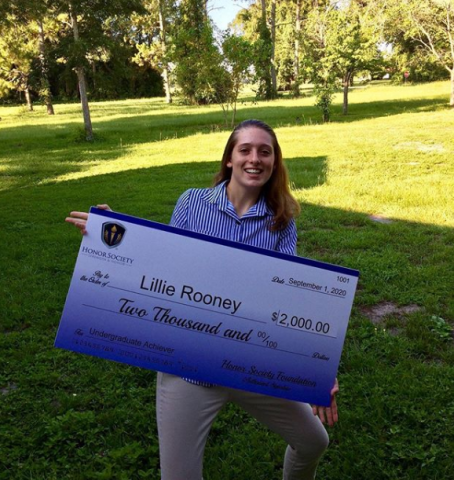Honor Society Scam Protection Tip #6: You Never Initiated the E-mail
Aug 17,2020
This is from the Honor Society published book called "How to Avoid the Top E-mail Scams" by Mike Moradian, written to help protect our member and student community from common online scams. To learn more about the book or to purchase a copy, click here.
Tip #6: You Never Initiated the Email
This is a tricky but important topic for us to cover. By definition, honor societies are an exception to this rule because they initiate the first contact with you. Honor societies generally have partnerships in place with organizations such as universities in order to identify and select eligible members. Keep that in mind when reviewing an honor society invitation, and remember it may be an exception to this general rule.
As we mentioned earlier, if you never initiated an email, why should you be receiving one, out of the blue, making all of these amazing and grandeur promises? If you receive an email with a subject line “Congratulations!!! You won our lottery!!” this should raise some suspicions. If you never entered the lottery in the first place, then how can you be a big lottery winner?
The same holds true for scholarships and other things that we all hope to win in this lifetime.
Here are common emails that might convince you to click on a link, of which you never even applied:
- Lottery: We all want to win the lottery. If we did, all of our life’s worries and woes would fade into the sands of time. It’s the ultimate dream. That’s why we can’t help but buy the scratch-offs at the local gas station from time to time. Well, with the internet today, there are a variety of lottery-style contests you can enter (although we don’t recommend it). If you receive an email claiming you are the winner of some kind of lottery, if you never even bought a ticket, how can that be? And if you are playing online lotteries, then be sure to be very, very careful about the contact you receive from the lottery agency.
- Scholarships: College can be downright impossible to fund today, with Forbes estimating that collectively, students carry $1.5 trillion in debt as of 2019. That’s why so many students and parents are considering scholarships. There are thousands of them out there, with too many students failing to apply for these niche opportunities. However, if you never applied for a certain scholarship, but receive an email that you miraculously were the winner, that should be a red flag. To get a scholarship, you will need to exert yourself in some way. Generally, you will need to write an essay on some topic proving that you are deserving of this specific scholarship. Here at HonorSociety.org, we can help you apply and manage scholarship applications, which means we will work as a third party intermediary that keeps you on-track and protected from solicited phishing emails.
- All-Expense Paid Trips: Great – you just won a 7-day cruise in the Caribbean for two. But wait, did you ever apply to be the winner? Probably not. Therefore, don’t click on the link to redeem your winnings.
- Grants: Grants are a great way to get projects moving on behalf of the government. Local governments are allocated a certain amount of funds every year that often go unused. Applying for grants is one of the smartest things you can do, especially for a niche business or project. Just remember: if you didn’t apply for the grant, you probably didn’t win it. There is only X amount of grant money allocated each year, which means at the very least, you need to apply and you need to fill out some form stating why you should receive it.
- Loans: Loans are a natural part of life, which is why so many scammers will try to use them to get you to click on a link. Again, if you didn’t apply for the loan on your own, or through a bank or credit agency, why are you now the recipient of the loan? It just doesn’t add-up.
- Giveaways: This one can be tricky because social media is full of so many legitimate giveaways today. They have become a requirement for brands and individuals that want to remain competitive. If you receive an email about being the winner of a giveaway, first ask yourself if you 1) applied at all and 2) how you applied. If you applied on Instagram by commenting on a post, then you should receive your notice there. If you applied through Facebook Messenger, then you should receive it there. In some cases, you do apply with an email, which is why you should use our other tips to ensure it’s a legitimate email.
One great tip is to keep a running log of all the things you apply to on a given basis. You can track applications, contests, lotteries, and giveaways, so you can know exactly what you did and did not apply to. This is a great way to ensure you are never tricked by this kind of phishing email.
For more on how to protect yourself online, read tips from our published book below:
Intro: How to Avoid the Top E-mail Scams
Tip #1: Look for the Display Name
Tip #2: Do Not Click the Links
Tip #3: Scan for Spelling Errors
Tip #4: Look for Personal Information Requests
Tip #5: The Offer is Unrealistic
Tip #6: You Never Initiated the E-mail
Tip #7: The Email Requests You Send Money
Tip #8: The Message Contains Some Kind of Threat
Tip #9: The Email Claims to be From a Bank or Government Agency
Tip #10: Your Gut Tells You Something is Wrong
Extra Credit #1: Tips for Staying on Top of Phishers
Extra Credit #2: Knowing When It's a Real Email: 5 Tips





